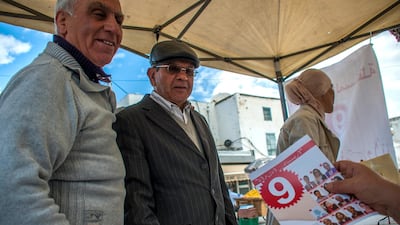Tunisia is hoping to break through barriers with its first local election since the 2011 Arab uprisings — a vote that could produce the first female mayor of the capital, the first Jewish official with an Islamist party and new flock of mayors with greater powers.
The North African country is trying to consolidate its young democracy with Sunday's election, in which Tunisia's 5.3 million voters will choose local leadership from 2,000 lists of candidates.
The top vote-getters are expected to come from the Islamist Ennahdha party and the president's moderate secular Nida Tunis party, which govern together in a coalition. But nearly half the candidate lists are from independent groups that are pledging to address local issues.
Other candidates are focusing on voters frustrated by political elites and successive governments that many feel have failed to live up to promises of the 2011 uprising.
Tunisia has gone through a rocky transition to a democratic system seen as exceptional in a region dominated by authoritarian leaders.
More than half of the candidates in the local elections are under 35 and 49 per cent are women, a rarity in the Arab world. Eighteen lists are led by disabled candidates.
Read more: In first for Tunisia, police and soldiers head to polls
Among the most prominent candidates is Souad Abderrahim, a woman seeking to become the next mayor of Tunis. A pharmacist, former lawmaker and feminist activist, she is an independent who considers herself close to the Islamist party, and is running against 10 men in Sunday's most important race.
Ms Abderrahim calls her candidacy "a source of pride for Tunisia women". Tunisia has long been considered among the most liberal Muslim countries in terms of women's rights, but traditional views remain strong in some quarters and Islamic fundamentalism has resurfaced since the revolution.
"My conviction is that Tunisia is for everyone, and the constitution explains that Tunisians are equal in rights and responsibilities, independent of their sex, religion or colour," Ms Abderrahim said.
She is pledging to put soap in every school bathroom to improve public health, make day care more accessible, plant more trees and revitalise the city's UNESCO-recognised cultural heritage sites such as the walled old town of Tunis, the Medina.
Read more: France's Macron pledges to double investment in Tunisia
Another unusual candidate is Simon Slama, a Jew from the town of Monastir running with Islamist party Ennahdha who has stressed the importance of Tunisia's tolerance and cultural diversity.
The elections are seen as an important step in decentralising power beyond the capital Tunis and handing more powers to town councils across the country, from Mediterranean beach resorts to struggling desert towns.
The results are expected to suggest where the country is heading politically ahead of presidential and legislative elections next year.
For the first time, security forces took part in the vote. In the past, Tunisia's leaders considered it dangerous for police and soldiers to take political positions but the change is part of Tunisia's democratic shift. The media were not allowed to cover their voting, which took place a week ahead of time, to ensure their political views were not publicly known.
Electoral authorities organised get-out-the-vote efforts focusing on Tunisia's young people, whose high unemployment rates have fuelled disillusionment.

